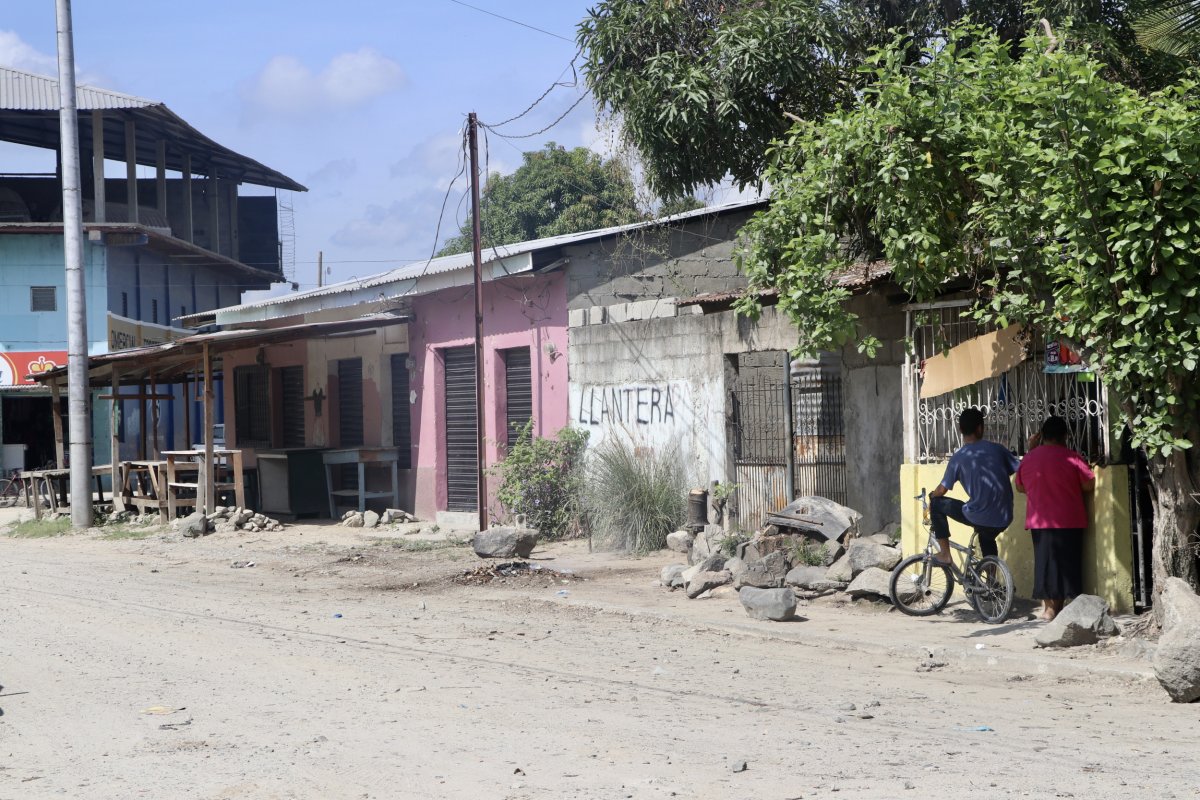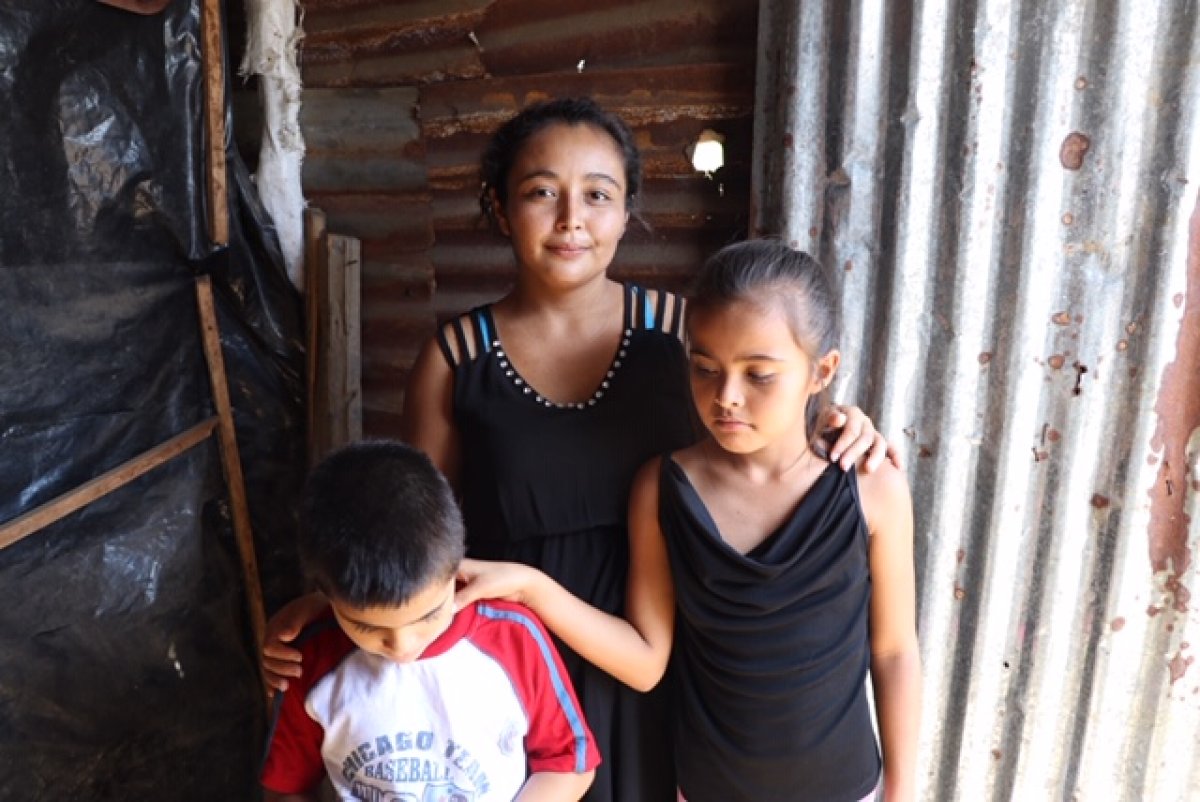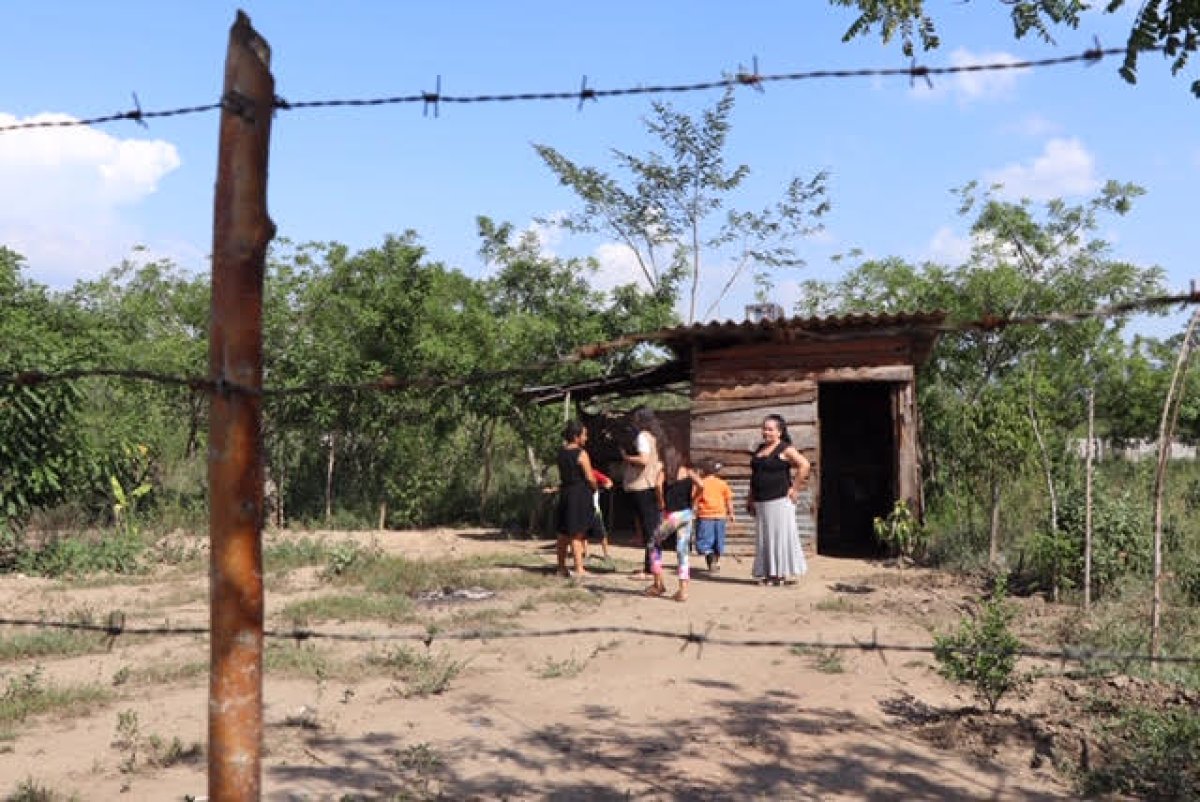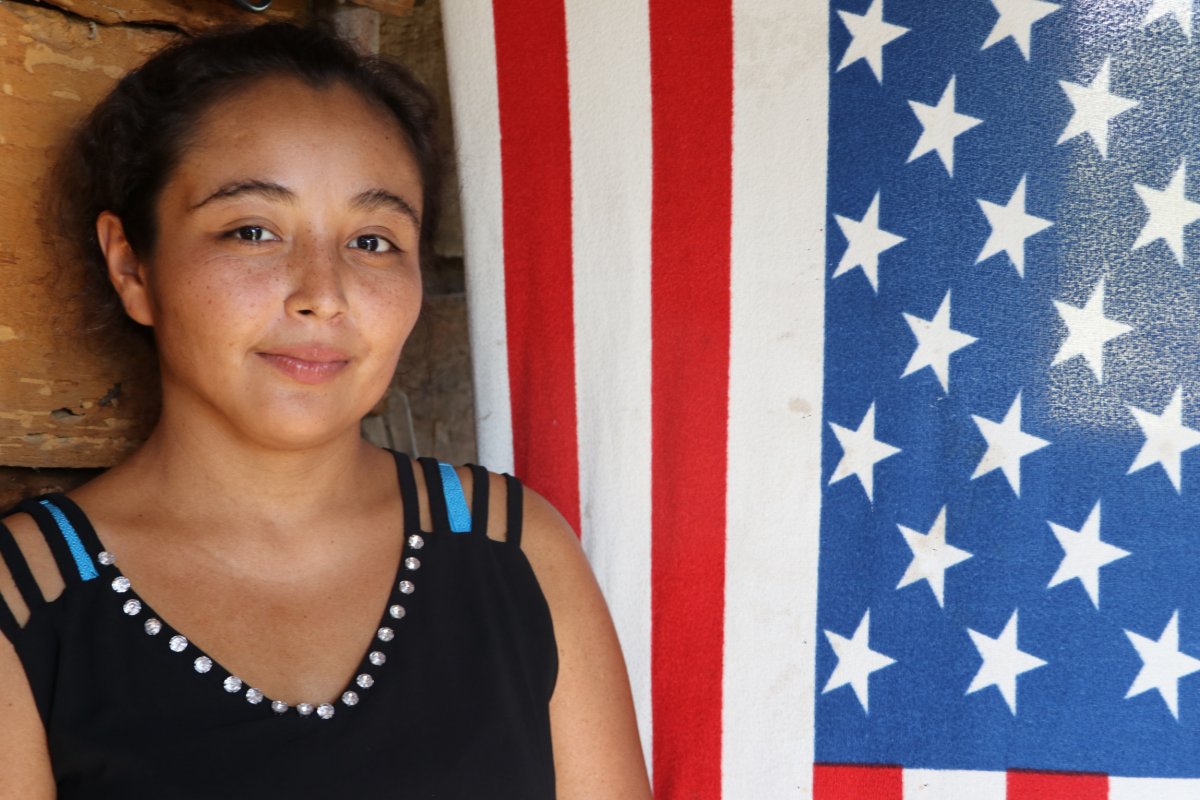Growing up in Rivera Hernández, one of San Pedro Sula's most notorious neighborhoods for gang violence and crime, 28-year-old mother-of-two Carmen Martinez knows the rules for staying alive.
If she wants to invite a friend or even a family member from outside the neighborhood over to her house, she has to get permission from a gang leader first; if she wants to start a business, she needs their blessing for that too and can expect to pay high extortion fees once she starts making money; if she's told to get out of town, she has about 24 hours before her life is at stake.
Like most neighborhoods across San Pedro Sula, Rivera Hernández is "run by gangs," with the district divided by at least seven rival groups, including "Mara Salvatrucha" (MS-13,) "Barrio 18," known in the U.S. as the 18th Street gang, and "Batos Locos" (crazy guys,) who strive to live up to their name.
"If you don't follow their rules, then maybe you'll get a few warnings from a gang member," Martinez, whose real name has been withheld to protect her identity, tells Newsweek. If you still don't obey the rules then that gang member will give you a choice, she says: "Leave or we'll kill you."
"I've seen people who have not paid rent or not paid their extortion fees and they get an anonymous warning telling them to leave the house within 24 hours," she says.
'I've learned to survive these conditions'
The 28-year-old mother, who has spent the majority of her life in the neighborhood living with her partner and their two children, a 6-year-old girl and 1-year-old boy, knows just how real a gang member's threat can be.
"My brother was forcibly recruited… They made him join, they tattooed him," she says. "Then, they killed him. He was 26."
After having a son of her own in the years after her brother's death, Martinez feared that her own child might face a similar fate if he grew up in the neighborhood.
"Gang recruitment, extortion… even if you try your hardest or make sure that these things don't happen, they're still hard to prevent," she says.

That is why, in April, Martinez and her family decided that she should try to make the arduous journey to the United States with her son, in the hope that there they might be able to build a brighter future.
Four months later, however, sitting shell-shocked in the office of San Pedro Sula's reception center for children deported back to Honduras, Martinez says the journey is one she will never try to make again after what began as a pursuit of the "American dream" quickly unraveled into a "nightmare."
Instead of finding a safe haven for her child, "my son almost died," Martinez says.
'I want a better life, but I won't try again'
The mother and child had very nearly reached the U.S., making their way to Reynosa, Mexico, which borders Texas, when they were apprehended by Mexican immigration authorities.
"We were getting on a bus in Reynosa when immigration officers asked us to present papers. We didn't have any so we were taken to a perrera," she says, referring to the holding cell she and her son were held in as a "dog pound."
Then, Martinez says, her son fell seriously ill, developing a harsh cough and symptoms of flu. "His eyes were swollen, he had a cough and the flu. He wouldn't eat and he wouldn't drink."
It also did not help that for the two weeks Martinez and her son were detained, they were forced to sleep on the cold hard floor "until I begged someone from immigration to find me a little mattress and they did."
Looking back on the experience, Martinez says: "It's a nightmare. I want a better life, but I won't try again."
"Everyone who leaves wants to make it to the U.S. I had been painted a very beautiful American dream, but no one ever told me that I would have to jump over fences with a child… No one told me that if immigration catches me, I would have to sleep on the floor and go hungry. They only spoke about the American dream… Not everything you have to go through to get there."
With no plans to try and make the difficult journey to the U.S. again, Martinez says she hopes to "try to survive" by opening up a shop selling chicken. If her shop does start to bring in money, she is likely to face an "extortion fee"—the price of being in business in San Pedro Sula.
"We don't have much money and I don't have any other choice. I've learned to survive these conditions," she says.
'The important thing, for me, was for my son to be operated on...'
Just over 20 miles outside San Pedro Sula, in a rural town called Naco, Lurbin Pasita Contreras, a five-months pregnant mother of two, says she too has learned to survive with what little she has.
Sharing a small makeshift bedroom with her husband and two children in a shack donated by the local community, 25-year-old Contreras and her family have learned to live without access to water, electricity or basic sanitation.
Meanwhile, a sprawling American flag serving as the single doorway in the family's home is a constant reminder of another door Contreras says her family has firmly closed.
Like Martinez, Contreras says she too has given up on the idea of the American dream after her own harrowing experience trying to make it to the U.S. in search of treatment for her sick son.

Partially blind, 8-year-old Antony "only sees shades" and has special needs, Contreras says. However, he has never been formally evaluated by a doctor, so she does not know the name or cause of his condition.
While the 25-year-old mother says she had hoped to reach the U.S. when she decided to leave Honduras with her son, ultimately, "I didn't care where I went. The important thing for me was for my son to be operated on."
Once she and her son arrived in Mexico, however, they were afraid to keep pushing forward to the U.S. border and instead spent months living on the streets, in fear for their safety.
"I didn't try because I was scared… Especially for my child because there were kidnappings and it was too risky," she says.
Living in a tent on the streets in Mexico, however, Contreras says she also feared for her and Antony's lives. "We didn't have anywhere to live…and I couldn't find work. I was scared we might be assaulted… I had heard of things happening in the streets."
Of course, Contreras' fears are far from unfounded, with thousands of migrants and asylum seekers traveling through Mexico each year falling prey to criminal groups who make a living kidnapping and holding them for ransom, while those whose families can't afford to pay face the threat of being killed. Some are tortured or abused regardless of whether their family can pay for their release, while women and girls are particularly vulnerable to rape and sexual assault.
Eileen Baquedan, a psychologist working at San Pedro Sula's reception center for children deported back to Honduras, says she has heard harrowing accounts from children and parents left scarred by their journey in search of refuge.
Children return to Honduras anxious, tired, hungry and sick. Some show signs of depression, while others appear to have been shocked into silence.
"Some kids who have had really difficult experiences say they have witnessed violence and kidnapping," she tells Newsweek, sitting behind her desk in her office. "The majority of children who get kidnapped don't seem to be abused, but they're parents, yes. The parents are sometimes raped and children have to see that happen."
According to Amnesty USA, as many as 20,000 migrants are believed to fall prey to kidnapping each year, while the Mexican National Human Rights Commission estimates that criminal gangs make as much as $50 million each year off of the abductions.
Migrants whose families may not have the means to pay criminal groups for their release face the risk of being killed, while others may face torture and abuse.
Amnesty International estimates that as many as six out of every 10 migrant women and girls experience sexual violence during the journey from Central America to Mexico.

Contreras says that while both she and her son were "lucky" to have evaded criminal groups in Mexico, a former neighbor they had been traveling with was not so fortunate.
"We got separated in the journey and we were worried something had happened to him," Contreras said. Later, her worst fears were confirmed when friends from back home told her he had been killed in Villahermosa in Mexico's Tabasco State.
During their time living on the streets, Contreras said her son, Antony, also grew "very sick," making her fear more than once that his life could be at stake during those difficult months. "He would get very sick… It would get cold at night and he would get a fever," she says.
Afraid of what might happen if they stayed in Mexico, Contreras eventually decided it was time to return home and give up on the American dream for good.
"Now, I just want to try to build a life here," she says. "I want to fix this house and I want to give a better life to my kids."
The Direccion de Niñez, Adolescencia y Familia (Directorate for Children, Youth and Family,) the UNICEF-funded government program that donated the house Contreras and her family are currently living in, is doing what it can to help her do that.
However, resources to support the thousands of Hondurans returning to the country are scant and the family has been relying on what income Contreras' husband, who works as a bus driver and handyman, can bring in, as well as on the kindness of neighbors, who often welcome the family into their homes to use their washrooms and electricity.
While Contreras says she will not risk the journey to the U.S. border again, she does wish there were "more opportunities, especially in the U.S." for asylum seekers.
Americans who wonder why thousands of Honduran families keep risking their lives just to be turned away at the U.S. border should know, she says, "there are a lot of reasons that push someone to leave."

Uncommon Knowledge
Newsweek is committed to challenging conventional wisdom and finding connections in the search for common ground.
Newsweek is committed to challenging conventional wisdom and finding connections in the search for common ground.
About the writer
Chantal Da Silva is Chief Correspondent at Newsweek, with a focus on immigration and human rights. She is a Canadian-British journalist whose work ... Read more
To read how Newsweek uses AI as a newsroom tool, Click here.








